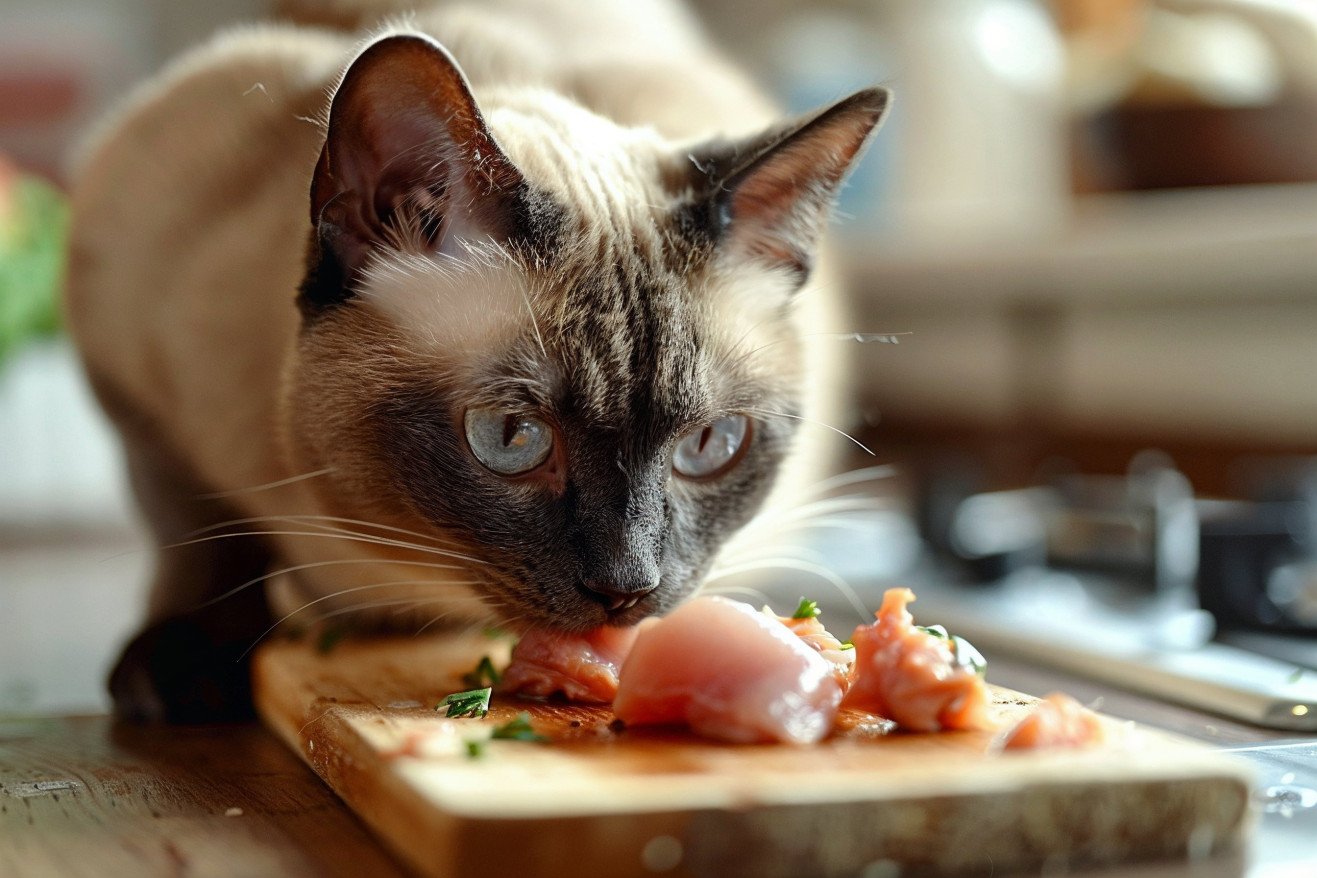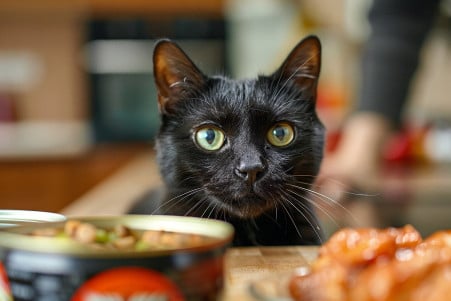Is It Safe to Feed Your Cat Raw Chicken? Dietary Dangers and Benefits
8 May 2024 • Updated 7 May 2024

Thinking about incorporating raw chicken into your cat's meals? Here's what you need to know about the potential benefits and drawbacks. While raw chicken can offer some nutritional value to cats, there are also concerns about bacterial contamination, including salmonella. As a result, many experts recommend feeding cats cooked chicken as a safer alternative that still offers the same lean protein. However, if you're interested in feeding your cat a raw diet, it's important to understand that you can still do so safely with the right precautions.
To determine whether or not raw chicken can be a healthy part of our cats' diets, we need to rely on expert opinions from the fields of veterinary nutrition and food safety. By examining scientific research, expert advice, and input from cat nutritionists, we can take a deep dive into the most important things to consider when it comes to feeding cats raw chicken. This will give you a well-rounded view that will help you decide what's best for your cat based on their specific circumstances.
Is it safe to feed your cat raw chicken?
Potential Risks of Feeding Raw Chicken to Cats
While there are some risks associated with feeding raw chicken to cats, there are also some potential benefits if it's done properly. According to Genius Litter, the high protein content of raw chicken is ideal for a cat's carnivorous diet, and raw chicken is also low in carbohydrates, which can be easier for cats to digest.
In addition, raw chicken contains important nutrients like magnesium, which is important for the immune system, muscles, and nerves, and potassium, which is important for fluid balance, blood pressure, and muscle function. Purina also explains that the process of chewing and tearing raw meat can help keep cats' teeth clean by removing plaque and tartar.
For cats with allergies or sensitivities, raw chicken may be easier to digest than some commercial cat foods. Hare Today also explains that a raw diet can be more in line with a cat's natural hunting and eating patterns, which some cat owners may find appealing.
That said, it's important to note that raw chicken alone does not provide a complete and balanced diet for cats, and additional nutrients need to be supplemented to ensure that cats get everything they need. As with any changes to a cat's diet, it's important to talk to a vet before starting a cat on a raw chicken diet.
How to Safely Feed Cats Raw Chicken
If you choose to feed your cat raw chicken, it's important to start with high-quality, fresh chicken from a trusted source to reduce the risk of bacterial contamination. Purina also notes that you should make sure to clean all surfaces that come in contact with the raw meat and either wash your hands or wear gloves when handling it.
In addition, it's important to make sure the raw chicken is stored properly in the refrigerator or freezer until you're ready to use it. Catster points out that it's important to watch portion sizes, as feeding your cat too much raw chicken can lead to digestive upset or nutritional imbalances. If you're just starting to feed your cat raw chicken, you should also introduce it slowly to give your cat's digestive system time to adjust and reduce the risk of stomach upset.
You may also need to add supplements, such as calcium and vitamins, to the raw chicken to make sure your cat gets all the nutrients they need, according to Hare Today. If you take the right precautions and follow the proper steps, raw chicken can be a safe and healthy part of your cat's diet.
Is Cooked Chicken Safe for Cats?
Cooked chicken is a safer and more digestible option for cats than raw chicken. As Untamed explains, cooking the chicken will kill any bacteria that could be harmful to your cat, including salmonella and listeria. However, it's important to make sure the chicken is unseasoned and free of any herbs, spices, or other ingredients that could be toxic to cats.
To prepare chicken for your cat, Love Nala suggests boiling or simmering the chicken breast or thigh until it's no longer pink, removing the skin and bones, letting it cool, and then shredding it. This will ensure that the chicken is fully cooked and safe for your cat to eat.
While cooked chicken can be a healthy part of your cat's diet, it may not be nutritionally complete. According to Catster, you may need to add taurine and essential fatty acids to your cat's diet if you're feeding them a lot of cooked chicken. That said, the best way to feed your cat chicken is to give it to them as an occasional treat or as part of a nutritionally complete commercial cat food.
Dealing With Possible Chicken Allergies and Sensitivities
Cats can be allergic or sensitive to chicken, which can lead to skin problems, stomach issues, and more. WagWalking notes that food allergies happen when the immune system misidentifies a common protein like chicken as a harmful substance and attacks it. Genetics and eating the same food for a long time can also play a role in a cat developing an allergy to chicken.
The best way to find out if your cat is allergic to chicken is to do an elimination diet trial, which is recommended by KOHA Pet. This means feeding your cat a novel protein that they haven't had before for 6-8 weeks and then slowly reintroducing chicken to see if there's a reaction. Allergy testing with a vet can also help you determine what your cat is allergic to.
If your cat is allergic to chicken, you can use alternative proteins like rabbit, duck, venison, or other novel proteins. RawzNaturalPetFood recommends slowly switching your cat to a new diet and watching for a change in symptoms. It's important to work with a vet to get an accurate diagnosis and treatment plan for your cat's food allergies.
Raw Chicken Diets for Kittens: What to Know and What to Watch Out For
Feeding kittens raw chicken comes with a number of risks that pet parents should take into account. As explained by Hare Today, kittens have more specific nutritional requirements than adult cats because they are growing and developing so quickly. Their immature immune systems also leave them particularly susceptible to the bacterial infections that can come from eating raw meat, including Salmonella, Clostridium, and Campylobacter, as noted by IAMS.
Kittens are also at risk for nutritional deficiencies when eating raw chicken, even if the diet is supplemented with bones or eggshells, according to IAMS. Kittens need a diet that is specifically formulated to meet their growth needs, and raw chicken alone won't meet those requirements. SpringNaturals points out that while cats in general benefit from a diet that's high in animal protein, raw meat can also contain dangerous parasites and bacteria.
Because of these concerns, veterinarians don't recommend feeding kittens raw chicken. Yahoo Sports even goes so far as to say that if you're going to feed your kitten raw chicken, you should make sure to consult with a vet first and follow strict food safety guidelines. While commercially available raw kitten diets may be a safer option, it's best to talk to your vet about the pros and cons of these diets as well.
Conclusion: Should You Feed Your Cat Raw Chicken?
The question of whether or not to feed your cat raw chicken is a complicated one, and there are several factors to consider on both sides of the issue. On the one hand, raw chicken can be a good source of important nutrients like protein, magnesium, and potassium. On the other hand, raw chicken can also be a source of dangerous bacteria and other health problems.
Most veterinary professionals and organizations recommend against feeding domestic cats raw chicken because their digestive systems are not as well-equipped to deal with the pathogens and parasites that can be found in raw meat as the digestive systems of wild cats. According to Genius Litter, the risks of feeding cats raw chicken include salmonellosis, listeriosis, and nutritional imbalances.
If you decide to feed your cat raw chicken, it's important to make sure you're getting the freshest, highest-quality meat possible, and to handle it with the utmost care. Purina suggests disinfecting surfaces, freezing the meat to kill bacteria, and watching for signs of illness.
For most cat owners, cooked chicken or a complete and balanced commercial cat food is probably a better and safer option. Daily Paws says that it's important to take into account each cat's unique circumstances, including their health, preferences, and risk factors, when deciding whether or not to feed them raw chicken.
As with any dietary changes, it's important to talk to a vet before feeding a cat raw chicken and to consider the cat's unique circumstances, including their health, preferences, and risk factors.


